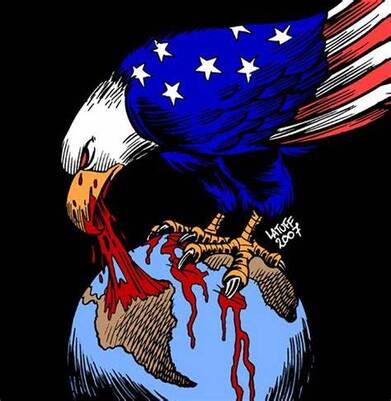|
On September 6, 2021, Jackson Hinkle, a former candidate for San Clemente City Council, said, “I’m a Marxist-Leninist. I’m an anti-imperialist. I’m an American patriot.” A statement like this is based on a number of politico-theoretical errors. Patriotism - and nationalism - is a reflection of a specific material reality; it always appears as a derivative ideology which draws its meaning from the power bloc that appropriates it and deploys it towards its own objectives. In metropolitan formations of advanced capitalism, the concrete content of nationalist ideology was foundationally defined by the Westphalian peace treaties of 1648. European nationalism emerged as a non-secular majoritarian concept, invoking Christian tropes and cultivating hatred toward domestic minorities. Externally, it was characterized by colonial conquests. Westphalian arrangements were preceded by Spanish conquistadores’ pillage of the New World’s enormous gold resources. Within months of the Westphalian treaties, Oliver Cromwell’s army confiscated most of Ireland’s territories. Acute inter-imperialist rivalry between major European nation-States resulted in bloody wars, which regularly destroyed distant lands. Internal oppression of specific cultural groups and external subjugation of Third World people continues to shape and sustain the imperial idioms of metropolitan nationalism. These influences are expressed in the three types of labor aristocracies which exist in the majority of Global North countries. First, the settler-colonial labour aristocracy is established through the denial of self-determination to those populations residing on indigenous land seized by the settler population. Secondly, the native labour aristocracy is established through systematic discrimination against immigrants, who act as visible targets of colonial and racist discourses. Third, the metropolitan labor aristocracy is established through value transfer from the dependent countries, which helps in co-opting sections of the working class. Taking into account First World nationalism’s regressive foundations - imperialism and racism - it is doubtful whether socialist politics can gain anything useful from the utilization of patriotic themes. Left nationalism can easily slide into national chauvinism because multiple layers of workers in rich countries have no objective interest in anti-imperialist socialism; the adoption of a massive policy of genuine redistribution of wealth between the affluent nations and the poorer nations may not seem as monetarily attractive as the prospect of parasitically living off the vast surplus value produced by the super-exploited proletariat of the Global South. Insofar that there is no material basis for robust internationalism in the imperial core, the subjectively practiced forms of leftist patriotism can degenerate into mere demands for the redistribution of imperialist wealth. While traditions of patriotic socialism are present in imperialist countries, they don’t constitute a proper historical memory to function as the full-fledged scaffold for a mass movement. Third World nationalism, in contrast, assumes a primarily popular character because its originary conditions were marked by a liberatory fight against the state of subjugation imposed by bourgeois nationalism. Unlike Euro-Atlantic patriotic cultures, nationalism in the colonized countries was unifying, inclusive and secular as it identified a common enemy in colonialism and promised to end the poverty, hunger and misery unleashed by it. Since the imperialist opponent was extremely powerful, a strong emphasis was laid on the crucial need to forge ties with other national liberation movements. Thus, international solidarity emerged organically from the difficult realities of struggle. Instead of superimposing patriotic tinsels on the socialist agenda, leftists in the Global North should try to develop a revolutionary praxis which makes their fellow citizens aware of their role in perpetuating the system of imperialist capitalism. As the direct and indirect beneficiaries of imperialist capital accumulation on a global scale, First World people should be the last ones to erase the devastating ravages of neo-colonial robbery. They can and must recognize that their primary responsibility, by virtue of their situatedness in imperial territories, lies in challenging the role of their governments in undermining the development of the Global South. Americans, as people who live in the imperialist heartland, carry an even greater responsibility for initiating a politics of anti-imperialism. However, such a political programme can be realized only when it is understood that the American identity is completely hollow, structurally built on native genocide, racist oppression and imperialist destruction. AuthorYanis Iqbal is an independent researcher and freelance writer based in Aligarh, India and can be contacted at [email protected]. His articles have been published in the USA, UK, Canada, Australia, New Zealand, India and several countries of Latin America. Midwestern Marx's Editorial Board does not necessarily endorse the views of all articles shared on the Midwestern Marx website. Our goal is to provide a healthy space for multilateral discourse on advancing the class struggle. - Editorial Board Archives September 2021
3 Comments
Ben
9/12/2021 07:55:10 am
Great article 🙏🙌
Reply
Lorenzo
9/14/2021 10:28:50 am
Julius Rosenberg and Ethel Rosenberg They risked their lives in search of an atomic balance that, if they had not done so, there would have been millions more deaths from imperialism, there are really many, who keep them in the public shadows
Reply
Lorenzo
9/14/2021 10:32:50 am
Julius Rosenberg and Ethel Rosenberg Both were part of the Young Communist League, the youths of the Communist Party of the United States.
Reply
Leave a Reply. |
Details
Archives
July 2024
Categories
All
|

 RSS Feed
RSS Feed